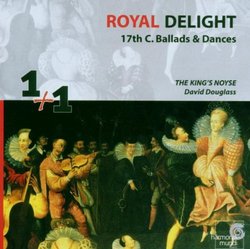| All Artists: English Traditional, John [1] Playford, English Anonymous, William [Composer] Byrd, Michael Praetorius, John [Bass] Whitfield, Johannes Schultz, Samuel Scheidt, William Brade, Thomas [1] Simpson, Gregorian Chant, Scottish Traditional, Henry Stonings, John Baldwine, John Marchant, King's Noyse, Ellen L. Hargis Title: The King's Noyse, dir. David Douglass: Royal Delight: 17th Century Ballads & Dances Members Wishing: 2 Total Copies: 0 Label: Harmonia Mundi Fr. Original Release Date: 1/1/2005 Re-Release Date: 9/13/2005 Album Type: Import Genres: Dance & Electronic, Folk, Special Interest, Classical Styles: Marches, Opera & Classical Vocal, Chamber Music, Historical Periods, Baroque (c.1600-1750), Classical (c.1770-1830), Early Music Number of Discs: 2 SwapaCD Credits: 2 UPC: 093046737023 |
Search - English Traditional, John [1] Playford, English Anonymous :: The King's Noyse, dir. David Douglass: Royal Delight: 17th Century Ballads & Dances
 | English Traditional, John [1] Playford, English Anonymous The King's Noyse, dir. David Douglass: Royal Delight: 17th Century Ballads & Dances Genres: Dance & Electronic, Folk, Special Interest, Classical
|
Larger Image |
CD Details |
CD ReviewsDelight was the right word! Leslie Richford | Selsingen, Lower Saxony | 03/13/2009 (5 out of 5 stars) "Royal Delight. 17th Century Ballads and Dances. Performed by Ellen Hargis, soprano; Paul O'Dette, lute and cittern; The King's Noyse [David Douglass, violin; Robert Mealy, violin and viola; Scott Metcalf & Jane Starkman, violas; Emily Walhout, bass violin], dir. David Douglass. CD 1 was recorded at the Campion Center in Boston, MA, from November 3 thru 5, 1992 and originally released in 1993 under the title "The King's Delight". CD 2 was recorded at the same location from March 14 thru 16, 1996, and originally released in 1996 under the title "The Queen's Delight". This reissue as a mid-price set (HMX 2907370.71) appeared in 2005. Total playing time: 144'20".
Some time ago I reviewed "The King's Delight" and wrote the following: "Although the music here is highly entertaining in itself, this CD should really only be heard after studying Jack Ashworth's informative booklet notes, and preferably also with some knowledge of 16th and 17th century English music. This period in English musical history is generally associated with the "viol consort" in which a group of differently-sized "viols" or "violas da gamba" played together with the musicians sitting around a set of notes, sometimes accompanied by a recorder or voice. This kind of music is quite ethereal but probably does not reflect the reality of life in early 17th century England (the epoque of Shakespeare, Webster and Jonson). In recent years it has been established that not only the nasal-sounding "viol", but also the violin was played "in consort", and various musicians have gone about re-creating this sound. Among the first were The Parley of Instruments in England and The King's Noyse in the USA, who here present their first-ever disk containing so-called "broadside ballads", interspersed with dance tunes, some of which have been delivered down to us in manuscript, others of which are of more traditional nature and have been arranged by David Douglass for this particular variety of consort. There are also three solos by that miracle of lute-playing, Paul O'Dette, using a different instrument each time. The effect of the whole is quite "folksy", approaching in some ways a "crossover" approach. The gentle strings of the instrumental pieces are captivating, while Ellen Hargis does a great job of making her ballads sound as they might have done in a 17th century tavern, including using a regional English accent. Her singing is, of course, not always "beautiful", with some quite harsh leaps and the recording venue producing some pretty sharp echoing at louder points - not something everyone will appreciate, but definitely contributing to the "authenticity" of the recording, insofar as there can be such a thing with music from such a distant period. I purchased this CD because it was awarded "Disk of the Month" status in a German-language Early Music magazine." The "Queen's Delight" album, here CD 2, is "more of the same", with some lively playing of renaissance violins and violas for the dance music, a couple of solos by Paul O'Dette on the lute or cittern and some great ballad-singing by Ellen Hargis, who excels in creating a crossover-atmosphere between classical soprano and folk-singer, even imitating the English country accents of the period. She gets some really attractive songs to sing here, the most memorable being "Barbara Allen" and "I Smell a Rat". The recorded sound is excellent, provided it is heard on good equipment: the high soprano voice is brought forward by the engineers and could cause problems on inferior sound-reproducing equipment (i. e. if played on a small computer or MP3 player). "Delight" was the right word for these disks!" |

 Track Listings (24) - Disc #1
Track Listings (24) - Disc #1